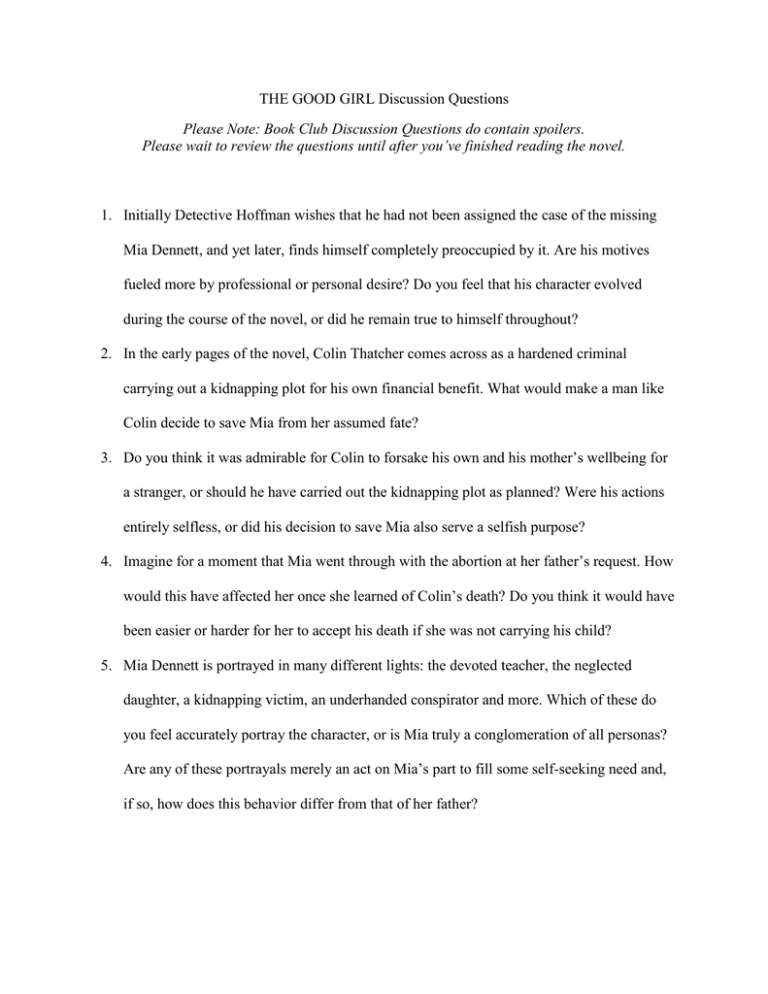THE GOOD GIRL Discussion Questions Please Note: Book Club
advertisement

THE GOOD GIRL Discussion Questions Please Note: Book Club Discussion Questions do contain spoilers. Please wait to review the questions until after you’ve finished reading the novel. 1. Initially Detective Hoffman wishes that he had not been assigned the case of the missing Mia Dennett, and yet later, finds himself completely preoccupied by it. Are his motives fueled more by professional or personal desire? Do you feel that his character evolved during the course of the novel, or did he remain true to himself throughout? 2. In the early pages of the novel, Colin Thatcher comes across as a hardened criminal carrying out a kidnapping plot for his own financial benefit. What would make a man like Colin decide to save Mia from her assumed fate? 3. Do you think it was admirable for Colin to forsake his own and his mother’s wellbeing for a stranger, or should he have carried out the kidnapping plot as planned? Were his actions entirely selfless, or did his decision to save Mia also serve a selfish purpose? 4. Imagine for a moment that Mia went through with the abortion at her father’s request. How would this have affected her once she learned of Colin’s death? Do you think it would have been easier or harder for her to accept his death if she was not carrying his child? 5. Mia Dennett is portrayed in many different lights: the devoted teacher, the neglected daughter, a kidnapping victim, an underhanded conspirator and more. Which of these do you feel accurately portray the character, or is Mia truly a conglomeration of all personas? Are any of these portrayals merely an act on Mia’s part to fill some self-seeking need and, if so, how does this behavior differ from that of her father? 6. Eve Dennett exhibits a strong emotional attachment towards Detective Gabe Hoffman throughout The Good Girl, and yet, at the end of the novel, she chooses to forsake that relationship for the benefit of her daughter. Do you feel that Eve’s feelings for the detective were genuine, or rather an instance of being caught up in the moment? In your opinion, was Eve appropriate in ending the relationship, or should she have continued on with Detective Hoffman regardless of Mia’s mental state and emotional needs? 7. Dr. Avery Rhodes suggests that Mia’s feelings for Colin Thatcher were an example of Stockholm syndrome: a psychological situation in which a kidnapping victim forms a bond with his or her captor. Do you feel that Mia was suffering from Stockholm syndrome, or that the relationship she developed with Colin was authentic? 8. Mia suffers from amnesia throughout the pages of The Good Girl. It’s only in the last few chapters that her memory comes back and she is able to recall her days inside the Minnesota cabin. Knowing, however, that Mia staged her own kidnapping, is it also possible to imagine that she faked the amnesia throughout the novel? Was Mia truly suffering from Acute Stress Disorder, or was this another act from a capable and conniving performer? 9. At the end of the novel we learn that Mia arranged her own kidnapping to seek vengeance against her father for a neglectful upbringing. Do you feel that Mia was justified in this behavior? What other actions could she have taken to get even with her father? Was his conduct as awful as Mia perceived in her mind for it to be? 10. After reading The Good Girl, who do you feel was the true victim, or victims, and the true conspirator? Have your opinions changed since beginning the novel, and if so, how?



